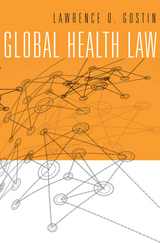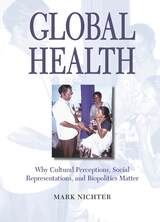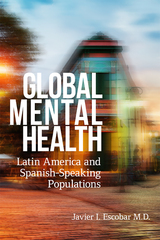9 start with G start with G


Deaths from infectious diseases continue to take a heavy toll even though there have been spectacular successes in their control over the last thirty years. In the developing regions, five of the ten leading causes of death and disease burden in 1990 were infectious diseases--respiratory infections, diarrhea, tuberculosis, measles, and malaria--while in the developed regions the only infectious disease among the ten leading causes of death in 1990 was respiratory infections.
This volume contains comprehensive data and detailed discussions of the global epidemiologies of twenty-three infectious diseases, including the above-mentioned conditions as well as hepatitis B, meningitis, polio, and tetanus.
The Global Epidemiology of Infectious Diseases will serve as a comprehensive reference for epidemiologists, public health professionals, and tropical disease specialists.

Over 50 percent of all deaths worldwide are from noncommunicable diseases. The results of the Global Burden of Disease Study dispel the notions that these noncommunicable diseases are related to affluence. In all developing regions, except for India and sub-Saharan Africa, noncommunicable diseases are responsible for more deaths than infectious diseases. Deaths from noncommunicable diseases have been projected to climb from 28.1 million deaths in 1990 to 49.7 million in 2020, increasing as a proportion of all deaths from 55 percent in 1990 to 73 percent in 2020.
This volume provides comprehensive data and detailed discussions of the epidemiologies of all major cancers and cardiovascular conditions, as well as those of chronic obstructive pulmonary disease, asthma, ulcers, diabetes, nephritis, cirrhosis, and appendicitis.

The international community has made great progress in improving global health. But staggering health inequalities between rich and poor still remain, raising fundamental questions of social justice. In a book that systematically defines the burgeoning field of global health law, Lawrence Gostin drives home the need for effective global governance for health and offers a blueprint for reform, based on the principle that the opportunity to live a healthy life is a basic human right.
Gostin shows how critical it is for institutions and international agreements to focus not only on illness but also on the essential conditions that enable people to stay healthy throughout their lifespan: nutrition, clean water, mosquito control, and tobacco reduction. Policies that shape agriculture, trade, and the environment have long-term impacts on health, and Gostin proposes major reforms of global health institutions and governments to ensure better coordination, more transparency, and accountability. He illustrates the power of global health law with case studies on AIDS, influenza, tobacco, and health worker migration.
Today's pressing health needs worldwide are a problem not only for the medical profession but also for all concerned citizens. Designed with the beginning student, advanced researcher, and informed public in mind, Global Health Law will be a foundational resource for teaching, advocacy, and public discourse in global health.

With lessons learned from COVID-19, a world-leading expert on pandemic preparedness proposes a pragmatic plan urgently needed for the future of global health security.
The COVID-19 pandemic revealed how unprepared the world was for such an event, as even the most sophisticated public health systems failed to cope. We must have far more investment and preparation, along with better detection, warning, and coordination within and across national boundaries. In an age of global pandemics, no country can achieve public health on its own. Health security planning is paramount.
Lawrence O. Gostin has spent three decades designing resilient health systems and governance that take account of our interconnected world, as a close advisor to the Centers for Disease Control and Prevention (CDC), the World Health Organization (WHO), and many public health agencies globally. Global Health Security addresses the borderless dangers societies now face, including infectious diseases and bioterrorism, and examines the political, environmental, and socioeconomic factors exacerbating these threats. Weak governance, ineffective health systems, and lack of preparedness are key sources of risk, and all of them came to the fore during the COVID-19 crisis, even—sometimes especially—in wealthy countries like the United States. But the solution is not just to improve national health policy, which can only react after the threat is realized at home. Gostin further proposes robust international institutions, tools for effective cross-border risk communication and action, and research programs targeting the global dimension of public health.
Creating these systems will require not only sustained financial investment but also shared values of cooperation, collective responsibility, and equity. Gostin has witnessed the triumph of these values in national and international forums and has a clear plan to tackle the challenges ahead. Global Health Security therefore offers pragmatic solutions that address the failures of the recent past, while looking toward what we know is coming. Nothing could be more important to the future health of nations.




As local governments and organizations assume more responsibility for ensuring the public health, identity politics play an increasing yet largely unexamined role in public and policy attitudes toward local problems. In Governing How We Care, medical anthropologist Susan Shaw examines the relationship between government and citizens using case studies of needle exchange and Welfare-to-Work programs to illustrate the meanings of cultural difference, ethnicity, and inequality in health care.
Drawing on ethnographic research conducted over six years in a small New England city, Shaw presents critical perspectives on public health intervention efforts. She looks at online developments in health care and makes important correlations between poverty and health care in the urban United States. Shaw also highlights the new concepts of community and forms of identity that emerge in our efforts to provide effective health care. Governing How We Care shows how government-sponsored community health and health care programs operate in an age of neoliberalism.
READERS
Browse our collection.
PUBLISHERS
See BiblioVault's publisher services.
STUDENT SERVICES
Files for college accessibility offices.
UChicago Accessibility Resources
home | accessibility | search | about | contact us
BiblioVault ® 2001 - 2024
The University of Chicago Press









